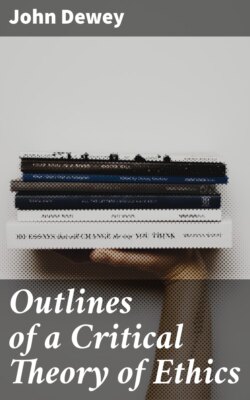Читать книгу Outlines of a Critical Theory of Ethics - Джон Дьюи - Страница 18
На сайте Литреса книга снята с продажи.
XII. Criticism.
ОглавлениеPleasure Not the End of Impulse.
Taking up the points in reverse order, we shall endeavor to show first, that the motive of action, in the sense of end aimed at, is not pleasure. This point in itself, is, of course, rather psychological than ethical. Taking up then the psychology of pleasure in its connection with will, we shall discuss its relation to impulse, to desire and to motive.
It is generally agreed that the raw material of volition is found in some form or other of the impulsive or instinctive actions. Such tendencies (e. g., the impulse for food, for drink, for unimpeded motion) clearly precede the reaching of an end, and hence the experience of any pleasure in the end. Our first actions, at least, are not for pleasure; on the contrary, there is an activity for some independent end, and this end being reached there is pleasure in an act which has succeeded. This suggests as a possible principle that pleasure is not so much the end of action, as an element in the activity which reaches an end. What Aristotle says of another matter is certainly true of instinctive action. "It is not true of every characteristic function that its action is attended with pleasure, except indeed the pleasure of attaining its end."
See Martineau, Types of Ethical Theory, Vol. II, pp. 299-300; Sidgwick, Op. cit., pp. 38-45.
